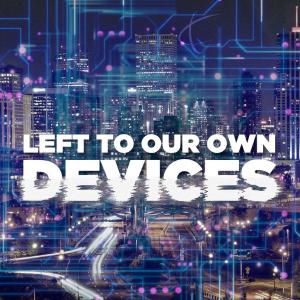 Jonathan and I are preaching and writing a series sermons and blogs together for the month of April. There has probably never been a better time to lead our churches in how we are to have God’s wisdom in our relationship with technology/devices. Having said that, this isn’t a new problem. It’s a very old one.
Jonathan and I are preaching and writing a series sermons and blogs together for the month of April. There has probably never been a better time to lead our churches in how we are to have God’s wisdom in our relationship with technology/devices. Having said that, this isn’t a new problem. It’s a very old one.
Psalm 81:11-12 (NIV) “But my people would not listen to me; Israel would not submit to me. 12 So I gave them over to their stubborn hearts to follow their own devices.
It wasn’t always this way. God’s people used to listen to him.
Creation
When God created the heavens and the earth and all creatures big and small one of his greatest achievements was creating mankind in his image.
And he gave his image bearers a task.
God blessed them and said to them, “Be fruitful and increase in number; fill the earth and subdue it. Rule over the fish in the sea and the birds in the sky and over every living creature that moves on the ground.”
29 Then God said, “I give you every seed-bearing plant on the face of the whole earth and every tree that has fruit with seed in it. They will be yours for food. 30 And to all the beasts of the earth and all the birds in the sky and all the creatures that move along the ground—everything that has the breath of life in it—I give every green plant for food.” And it was so. – Genesis 1:28-30 (NIV)
Afterward God rested. Calling all things good, He created Sabbath.
Did you notice that God gave mankind dominion of the earth and everything in it? God had made us as co-creators imparting upon us the ability to manipulate the elements for His glory. There was peace and harmony and flourishing because man was in harmonious relationship with the earth, with animals, and God.
Creativity and innovation is in our DNA, but something happened. God wanted Adam and Eve to create but they wanted to consume.
In the book Tech Wise, Andy Crouch and his family have made “Ten Tech Wise Commitments.” Number 2 on their list is
“We want to create more than we consume. So we fill the center of our home with things that reward skill and active engagement.”
Our devices can magnify our desire to consume and tech companies want to keep us as addicted consumers.
Ramsay Brown the co-creator of Dopamine Labs, a company that exists to help app developers access the same addictive qualities for their apps that Facebook has spent millions to perfect, says,
“We crafted [our software] to learn something about the structure of how human motivation works. It is now gathering enough data on its own to make meaningful observations to change human behavior.”
We must resist, for we were not designed to be addicted consumers.
Consumption
The Perfect harmonious relationship between God and man was disrupted when Adam and Eve ate of the fruit from the tree of the knowledge of good and evil. This was the one tree and the one fruit that was off-limits to mankind.
When Steve Jobs introduced the iPhone we just had to have one. Owning new technologies promise us happiness yet they are the source of our greatest unhappiness. They can never on their own deliver on what they promise. Maybe this is why something changes in us with each new innovation. With each new innovation our search for happiness continues because we are constantly disappointed. We keep consuming.
Adam and Eve had to have that fruit. They wanted what God had, knowledge. What they really needed was wisdom. Instead of information they required transformation. When they got what they wanted it did not give them what they wished.
Instead, what they received was a curse.
They received the curse of sin and shame. They were short sighted and did not listen to God. It led them both to attempt to hide themselves from the eyes of God.
Man may hid themselves from God in the garden, but we never lost our desire to be seen. And ever since man’s disobedience we have been guilty of using the elements of the earth not for the glory of God, but for our own glory. You could call that un-creation or de-transformation.
Ascension
Fast forward to Genesis 11 and mankind comes together to make what they at the time consider their greatest achievement. They used their ability to construct a tower, the greatest tower ever built with the most current technology available, bricks and tar.
Genesis 11:4 (NIV) “Come, let us build ourselves a city, with a tower that reaches to the heavens, so that we may make a name for ourselves;
They wanted to make a name for themselves. They wanted to reach into the heavens by themselves. Who needs God when you can build a tower to the heavens? They wanted to make themselves gods. But God sees and takes notice. He scattered them and confused their language.
If they were left to their own devices they would have convinced themselves they were gods or they would have wasted centuries trying, and we have. It wouldn’t have ended well, and for many it hasn’t. An organized and mobilized people with a god complex can be dangerous. People always gets hurt, or worse.
Instead of flourishing, humanity was seeking fame and what appeared ascending was really an example of descending. In God’s economy what is up is down and what is down is up. They would not break into heaven they would drown in their own pride.
That doesn’t just sound like an old testament Bible story does it?
We think we can ascend using technology. We believe that technology is our best tool to achieving greatness.
Jesus taught his disciples that greatness isn’t pronounced to those who ascend but those who get low. It takes humility to make yourself lower than someone else. In order to have humility we must learn empathy.
Our usage of our devices can perpetuate and grow our pride at the expense of others. In Genesis 11 mankind was not trying to please God and if they were they were poor communicators.
From Adam Alter’s book, Irresistible: The Rise of Addictive Technology and the Business of Keeping Us Hooked, M.I.T. psychologist Sherry Turkle has argued that technology turns children into poor communicators. Turkle shares an interaction that comedian Louis C.K. shared with Conan O’Brien in 2013. He explained that he was not raising children; he was raising the grown-ups they’re going to be. Phones, he said, are “toxic, especially for kids.”
They don’t look at people when they talk to them. And they don’t build the empathy. You know, kids are mean. And it’s because they’re trying it out. They look at a kid and they go, “You’re fat.” And they see the kid’s face scrunch up and they go, “Ooh, that doesn’t feel good to make a person do that” . . . but when they write [text], “You’re fat,” then they just go, “Mmm, that was fun. I like that.”
Communicating through technology causes us to begin seeing other people as objects and ourselves important. The solution is presence and face-to-face interaction. It’s the only way to gauge our impact on others and grow our love for them.
Incarnation
God’s impact on mankind did not come through remaining in heaven. He brings heaven to earth through his Son, Jesus. He communicates to use through his Son who teaches us how to love one another with humility and empathy.
“Humble yourselves in the sight of the Lord and he will lift you up.”
Instead of making a name for ourselves we can humble ourselves and through faith wear the name of Jesus. It will require that we lay down our devices and in doing so we may find our true happiness.

Jovan Barrington preaches for the Littleton Church of Christ near Denver, Colorado. Visit here to listen to sermons preached at the Littleton Church. Subscribe to his blog at jovanbarrington.com









